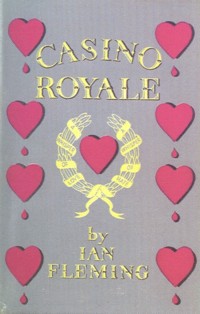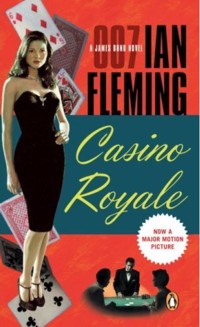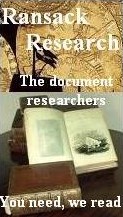| Casino Royale (1953) was the first of Ian Fleming's James Bond novels, the publication of which would have far reaching effects. Not only was it the first in a successful series of books spotlighting the 007 spy but it led to arguably the most successful film series in cinema history.
In its wake came an explosion of spy-themed entertainment starting in the 1960s that resulted in numerous successful television programs, movie imitations, more spy novels, and popular music recordings, not to mention the related merchandising bonanza in spin-offs, ancillary products and toys related to the spy mania that sprang up. It can also be argued that there was an important cultural shift caused by Fleming's creation, both in how people's moral perception of violence and sex was altered and in how that perception altered people. Pretty good for a modest little bite of escapism that clocks in at under 200 pages.
Bond's first adventure pits him against Le Chiffre -- the name relegates the character to the anonymity of a number or cipher. |

Dust jacket for the original publication of Casino Royale. |
Le Chiffre is an undercover agent for the Russian assassination organization SMERSH working as paymaster of S.O.D.A, the French based Communist trade union. He has embezzled the entire trade union fund, first, over half of it to finance a string of brothels just as the government came crashing down on such enterprises and, second, the balance to finance his desperate bid to win it all back at the baccarat tables at Casino Royale -- before his superiors at SMERSH discover his indiscretion.
Bond's mission is to face off against Le Chiffre and break him financially. A defeat for his opponent will mean the death of the SMERSH agent. Financed by his own government, Bond has a stake to equal Le Chiffre's. With the support of American agent Felix Leiter, French agent Mathis and teammate Vesper Lynd, Bond's chances seem good.
As the story begins, Bond has already parlayed his winnings a further $3 million francs to the good. References to earlier missions indicate that the agent has only recently won his 007 status. He has been chosen for this task because of a prior case he handled that involved exposing a rigged card game scam. But his cover is blown and a botched assassination attempt on the street proves it. To make matters worse, when he risks his entire roll on a single hand, Le Chiffre wins, pocketing Bond's bank and in one hand nearly attaining his goal of recoupment.
Shades of Fleming's travelogue writing in Thrilling Cities are present in his descriptions of places and things. We are given background on Royale-Les-Eaux, its attempts to challenge bottled water leader Perrier and Vittel, the failure of that enterprise and city's reliance on tourists and the takings from the refurbished Casino Royale. The casino, where tuxedos abound and people of all nationalities mix and mingle amidst the lavish trappings of a European playground for the wealthy, is the essence of the exotic location in a Bond story.
Fleming doesn't spare the details elsewhere. A restaurant interior is discussed, its mirrored alcoves in white and gilt, with red silk-shaded tables and wall lights a perfect picture of cool and inviting elegance. Careful attention is paid to what Vesper and Bond order for dinner and we learn that one must order enough toast with one's caviar. A Taittinger '45 is ordered but Bond acquiesces to the sommelier's recommendation of the Brut Blanc de Blanc 1943. Bond notes that it is the finest champagne in the world. This erudition is to be expected of Bond and serves to educate the reader in the finery of a man's world.
Bond's famous vodka martini, shaken not stirred, is first introduced here. In other books it is sufficient to name the drink and move on. But with Fleming, it's all in the details as he provides the drink's recipe: 3 measures of Gordon's, a ? measure of Kina Lillet, 1 measure of vodka, shake till ice cold and serve with a large, thin slice of lemon peel. He also notes that the vodka should preferably be made from grain, not potatoes. Fleming's goal was to stress refinement and delicacy in all matters of food and beverage.
Bond's preparations before his encounter with Le Chiffre take on aspects of ritual. He must don his heavy silk evening shirt, shoulder his chamois leather holster with .25 Beretta automatic and skeleton grip, fill his cigarette case with the special blend of Balkan and Turkish tobaccos made by Morlands of Grosvenor Street (of which he might smoke 70 in a day), and pocket his black, oxidized Ronson lighter. Only then is he ready to drive his 1933 4.5 litre Bentley, with a supercharger by Amherst Villiers, to the casino.
Likewise, the game is described in great detail through exposition directed at Vesper. She learns how it's played, the various strategies employed and the particular strategy that Bond intends. Then, at the table, we meet the players: An Italian, a Greek, a Maharajah, the Duponts, an American film star, a Belgian, the Danvers and, finally, Le Chiffre, who favors a Benzedrine vapour inhaler. Each of these characters is drawn in a manner that plays upon national stereotypes.
Bond's character is firmly established from the start as a chauvinist. He believes, "Women were for recreation," and decries their employment on a job because of their emotional baggage and the effort involved in caring for them. At one point he calls Vesper "The silly bitch" for not leaving "men's work to the men." Of course, this doesn't mean that he's immune to female charm and not for the last time in a Bond novel the "00" he finds himself developing a soft spot for the girl and falling in love, even if it does turn out to be temporary.
As for his 007 status, "It's not difficult to get a Double 0 number if you're prepared to kill people. That's all the meaning it has." Bond's ambivalence leads him to consider quitting the service. He waxes philosophically on the thin line dividing Good from Bad and considers that it's just a matter of perspective depending on which side you're fighting. He seems to believe that the world might need the likes of Le Chiffre in order that we can know Bad from Good. Mathis suggests that Bond make his missions personal and eliminate thoughts of duty or conscience. Bond will learn to take this approach momentarily.
Bond's spy craft is impeccable -- we are treated to his simple, but clever, stock and trade "burglar alarms" like the talcum powder on the inside rim of a porcelain handle, the hair placed strategically to tell if a drawer has been opened, and checking the water level in the toilet's water tank -- but it doesn't mean he can't get roughed up. In fact, in this very first adventure, Bond is tortured and fears for his manhood. It won't be the last time in the series that he is threatened in this manner.

First released in 2002, it is this cover that is used in the re-issue to coincide with the Daniel Craig movie. |
Although he seems to have many of the favorite elements worked out already, Fleming's writing style isn't perfected. There are some awkward phrases and moments that lack the panache a simple change of a word or two could have provided. It is surprising that Fleming is so strong in detailing cars, clothes, weapons, etc. yet weak in the description of people. Describing a character as looking like a well known person is generally considered a writer's shortcut and a bit of a weakness. Yet Fleming does it twice, first in comparing Bond to Hoagy Carmichael and, second, when Le Chiffre's thug is likened to Lon Chaney Jr.'s Lennie in Of Mice and Men.
Also, the story seems rather leisurely paced, much of the book lacking any real tension. It is a surprise both that it takes so long before Bond meets Le Chiffre at the tables and that it's all over so quickly at approximately the halfway point of the novel. |
It seems a long time between what we might think of as set pieces or dramatic turns of events. One thing, though, an indelible impression is left by the final line in the book, a few simple words acting like a brusque slap in the face. Utlimately, that ability to snap the reader out of their complacency may be the key to Fleming's success as a novelist.
Return to:
|


